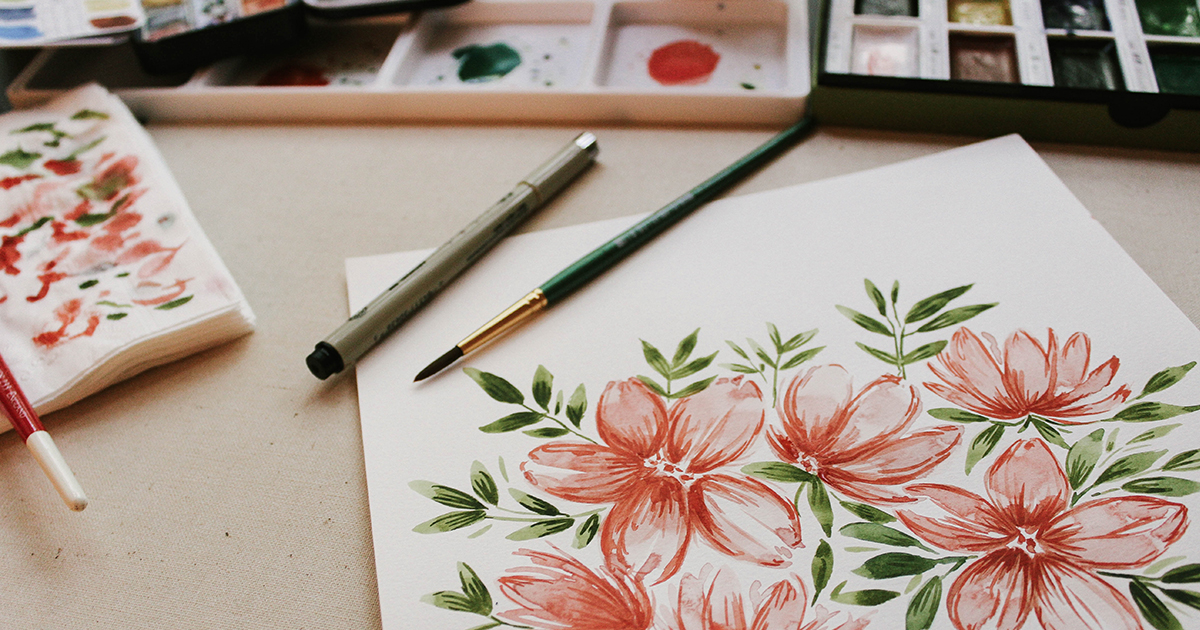Despite what your social media feed may tell you, we all have bad days. You know the ones where your mood is low and you just can’t seem to get yourself out of a funk? There’s nothing wrong with feeling down sometimes, but ugh, knowing that doesn’t really make it any easier to tolerate.
Recently, I had one of those days where I just felt sad. The sky was gray, I was lonely while working from home, and I just found myself wanting to crawl under the covers. As someone who has dealt with anxiety and depression for many years, I knew what I had to do.
It was time to get the serotonin flowing, so I put on my mood-boosting playlist, snuggled with my dog, and scribbled all of my feelings into my notebook. Of course, this didn’t suddenly make everything come up roses, but I felt a little less blue and more hopeful after just a few minutes.
We can’t avoid feeling down sometimes, and sitting with our more difficult emotions is courageous work, but it can help to have a few feel-good hacks up our sleeves to help us through. Read on for quick ways to get your feel-good chemicals, like serotonin, flowing.
What are feel-good chemicals?
When people talk about “feel-good chemicals” or “happy hormones,” they’re usually talking about the hormone oxytocin and chemical messengers, like serotonin, endorphins, and dopamine, which can also act like hormones. All four play an important role in helping to regulate our moods, among other bodily functions.
Oxytocin, also known as the “love hormone,” can help promote trust and bonding in relationships. Serotonin helps regulate our moods, with low levels being associated with depression. Endorphins are released to provide relief when we’re experiencing pain or stress, but may also be produced during pleasurable activities as well, like eating and exercise. Dopamine is strongly tied to the reward system in the brain. It gets released when our brains expect a reward and can help us feel alert, focused, motivated, and/or happy.
Our bodies naturally produce these feel-good chemicals, but if you’re feeling down, research shows there are things you can do to try to give your levels a boost.

Achieve your mental wellness goals
AbleTo programs give you 24/7 access to tools, activities, and content tailored to your needs. Sign up or log in to start exploring.

5 ways to boost your mood
Dance wildly. I’m sorry to be a cliché by saying, “dance like nobody’s watching,” but yeah, it works. I love to ugly dance — just flailing around in my living room with LCD Soundsystem blaring in my ears. You’d better believe that if someone saw me, I’d be mortified. And that’s the point. I’m free to just move my body because it feels good, and I’m not performing for anyone. Plus, a 2019 study shows that just listening to music is enough to activate pleasure centers in the brain. So, turn on one of your favorite playlists, carve out a few minutes in a private space for yourself, and just move in whatever way feels good for you.
Focus on what’s good. Research shows that simply thinking about people, moments, or things that we love can help to increase serotonin in your brain. You can achieve this in whatever way works for you. Take a moment to visualize a time when you felt cozy, joyful, or excited, and just sit with that memory for a little while. Or, grab a journal and jot down 3 things that went well and why. When participants in a study did this every day for a week, they reported increased happiness 6 months later.
Cuddle up. A simple hug can make a big difference. A 2020 review of research found that for some, the act of giving or receiving supportive physical touch can increase the production of serotonin and dopamine and decrease the production of the stress hormone cortisol, providing a mood boost. If that doesn’t work for you, consider offering yourself a form of supportive touch, snuggling up with a pet, or treating yourself to a massage. For me, curling up under a weighted blanket with my dog can bring instant calm to my nervous system.
Find the light. Seeking out time in the sunshine isn’t always easy, especially when we’re deep in the winter blues, but research shows it can increase our serotonin levels. If possible, try to spend at least 10 to 15 minutes outside on especially difficult days, connecting with nature and feeling the fresh air in your lungs. If the weather doesn’t agree or you have a tough time getting outdoors, consider getting your sunshine from a light therapy box that you can order online.
Create something. You certainly don’t need to be a professional painter to get those feel-good chemicals flowing. A 2014 study found that doing anything creative that you enjoy — painting with watercolors, making music, writing a poem, arranging a bouquet of flowers — can get more positive vibes flowing. I like to grab a few magazines, cut out images that bring me joy, and glue them on paper to create a collage. Try to take the pressure off of making a masterpiece. This is simply about the act of creating.
Allow yourself some grace
Keep in mind that moods are complex, and it’s not always easy to feel better quickly. Sometimes just engaging in activities that are intended to improve our moods can leave us with a more positive outlook.
If you’re having a tough time navigating your moods, a therapist can offer ongoing support. You can also talk to your doctor to discuss your specific brain chemistry, as some people simply have lower baseline serotonin levels.
We’ll be here along the way to encourage you to take 5 for yourself, reminding you that we all need and deserve a little pick-me-up sometimes.
Need help putting these tips into practice?
You may be eligible for virtual therapy, coaching, or on-demand self care from AbleTo. Each program is designed by clinicians and grounded in science. Sign up today and get the support you deserve.
By Katie Nave
Katie Nave is a writer and mental health advocate living in Brooklyn, New York. Her work has been featured in publications including Newsweek, Glamour, Business Insider, and Motherly. She has served as a producer for the National Women’s March and worked with organizations like Girls Inc. and CancerCare.
Clinically reviewed by Sarah Dolling, LPC.
Photo by Victoria Bilsborough/Unsplash.
The information featured on this site is general in nature. The site provides health information designed to complement your personal health management. It does not provide medical advice or health services and is not meant to replace professional advice or imply coverage of specific clinical services or products. The inclusion of links to other websites does not imply any endorsement of the material on such websites.


